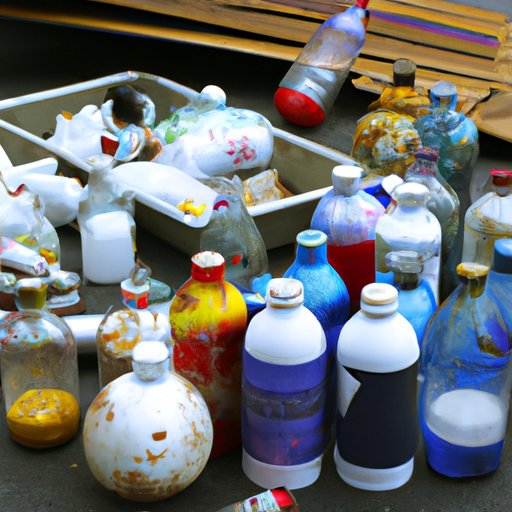Introduction
Mineral spirits are a type of solvent made from petroleum distillates. They are often used as paint thinners, cleaners, degreasers, and in various other industrial applications. While mineral spirits can be extremely useful, their disposal is an important issue to consider. Not only are they flammable, but they can also contaminate ground and surface water if not disposed of properly.

Contact Your Local Hazardous Waste Disposal Facility
The first step in disposing of mineral spirits is to contact your local hazardous waste disposal facility. They will be able to provide you with information on how to safely dispose of the mineral spirits in your area. It’s important to note that some facilities may require special containers for disposal, so it’s best to check with them before bringing any containers to the site.
The benefits of contacting your local hazardous waste disposal facility include having access to trained professionals who know how to handle hazardous materials. Additionally, they can provide you with the proper containers for safe disposal, as well as advice on how to store and transport the mineral spirits. Finally, by using a professional disposal facility, you can rest assured that the mineral spirits will be disposed of responsibly.

Collect Mineral Spirits in a Sealed Container and Take it to a Local Recycling Center
If your local hazardous waste disposal facility is too far away or doesn’t accept mineral spirits, you can collect the material in a sealed container and take it to a local recycling center. Most recycling centers will accept containers of mineral spirits, as long as they are labeled correctly and stored in a sealed container. The benefits of taking mineral spirits to a recycling center include being able to safely dispose of the material without worrying about contamination of the environment.
Use an Absorbent Material Such as Kitty Litter or Sawdust to Soak Up the Mineral Spirits, then Dispose of it in the Trash
Another option for disposing of mineral spirits is to use an absorbent material such as kitty litter or sawdust to soak up the material. Once the material has been absorbed, it can be placed in a sealed container and disposed of in the trash. The benefits of this method include being able to safely dispose of the material without having to worry about contamination of the environment.
Collect Mineral Spirits in a Sealed Container and Bring it to a Local Hazardous Materials Collection Day
Many areas also hold hazardous materials collection days where residents can bring sealed containers of hazardous materials such as mineral spirits for disposal. This is a great way to dispose of mineral spirits, as it ensures that the material will be handled safely and disposed of in an environmentally responsible manner. Additionally, many hazardous materials collection days provide free disposal services, making it a cost-effective option for disposing of mineral spirits.

Evaporate Mineral Spirits Outdoors by Placing it in a Shallow Pan and Allowing it to Evaporate
In certain cases, it may be possible to evaporate mineral spirits outdoors. To do this, simply place the material in a shallow pan and allow it to evaporate over time. This is a safe and cost-effective way to dispose of mineral spirits, but it should be done with caution, as evaporating mineral spirits can release harmful fumes into the air. Additionally, it’s important to note that this method should only be used in well-ventilated areas and never indoors.
Take Sealed Containers of Mineral Spirits to a Commercial Hazardous Waste Disposal Service
If you don’t have access to a local hazardous materials collection day, another option is to take sealed containers of mineral spirits to a commercial hazardous waste disposal service. These services specialize in the safe disposal of hazardous materials, and they can provide you with the necessary containers and instructions for proper disposal. The benefits of using a commercial hazardous waste disposal service include having access to trained professionals who know how to safely handle hazardous materials, as well as peace of mind that the material will be disposed of responsibly.
Donate Unused Mineral Spirits to Artist Groups or Painting Classes for Reuse
Finally, if you have unused mineral spirits that you no longer need, consider donating them to artist groups or painting classes for reuse. This is a great way to keep the material out of landfills and help others who may need it. Additionally, it’s important to note that donating unused mineral spirits to artist groups or painting classes is only recommended if the material is still usable; otherwise, it should be disposed of according to the methods outlined above.
Conclusion
Mineral spirits are a type of flammable solvent that must be disposed of responsibly. There are several options for safely disposing of mineral spirits, including contacting your local hazardous waste disposal facility, taking it to a local recycling center, using an absorbent material to soak up the material, bringing it to a local hazardous materials collection day, evaporating the material outdoors, taking sealed containers of mineral spirits to a commercial hazardous waste disposal service, and donating unused mineral spirits to artist groups or painting classes for reuse.
It’s important to remember that all hazardous materials, including mineral spirits, must be handled with care and disposed of responsibly in order to protect the environment. If you have any questions about how to safely dispose of mineral spirits, it’s best to contact a professional hazardous waste disposal service for advice.
For further information on the safe disposal of hazardous waste, visit the EPA website.
(Note: Is this article not meeting your expectations? Do you have knowledge or insights to share? Unlock new opportunities and expand your reach by joining our authors team. Click Registration to join us and share your expertise with our readers.)
